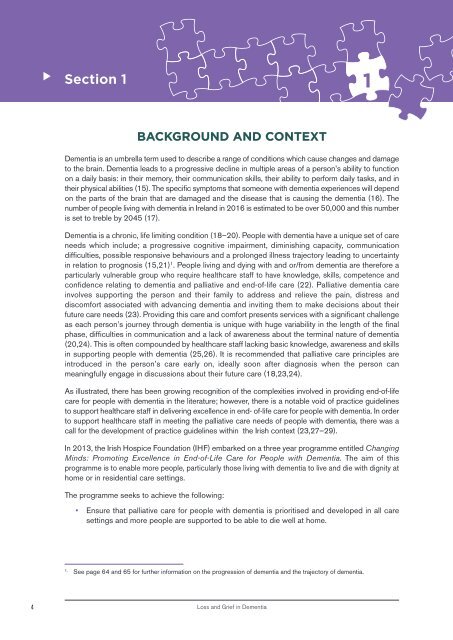Loss and Grief in Dementia
Final-Guidance-Document-3-Loss-Grief
Final-Guidance-Document-3-Loss-Grief
You also want an ePaper? Increase the reach of your titles
YUMPU automatically turns print PDFs into web optimized ePapers that Google loves.
s<br />
Section 1<br />
1<br />
BACkGROund And COntext<br />
<strong>Dementia</strong> is an umbrella term used to describe a range of conditions which cause changes <strong>and</strong> damage<br />
to the bra<strong>in</strong>. <strong>Dementia</strong> leads to a progressive decl<strong>in</strong>e <strong>in</strong> multiple areas of a person’s ability to function<br />
on a daily basis: <strong>in</strong> their memory, their communication skills, their ability to perform daily tasks, <strong>and</strong> <strong>in</strong><br />
their physical abilities (15). The specific symptoms that someone with dementia experiences will depend<br />
on the parts of the bra<strong>in</strong> that are damaged <strong>and</strong> the disease that is caus<strong>in</strong>g the dementia (16). The<br />
number of people liv<strong>in</strong>g with dementia <strong>in</strong> Irel<strong>and</strong> <strong>in</strong> 2016 is estimated to be over 50,000 <strong>and</strong> this number<br />
is set to treble by 2045 (17).<br />
<strong>Dementia</strong> is a chronic, life limit<strong>in</strong>g condition (18–20). People with dementia have a unique set of care<br />
needs which <strong>in</strong>clude; a progressive cognitive impairment, dim<strong>in</strong>ish<strong>in</strong>g capacity, communication<br />
difficulties, possible responsive behaviours <strong>and</strong> a prolonged illness trajectory lead<strong>in</strong>g to uncerta<strong>in</strong>ty<br />
<strong>in</strong> relation to prognosis (15,21) 1 . People liv<strong>in</strong>g <strong>and</strong> dy<strong>in</strong>g with <strong>and</strong> or/from dementia are therefore a<br />
particularly vulnerable group who require healthcare staff to have knowledge, skills, competence <strong>and</strong><br />
confidence relat<strong>in</strong>g to dementia <strong>and</strong> palliative <strong>and</strong> end-of-life care (22). Palliative dementia care<br />
<strong>in</strong>volves support<strong>in</strong>g the person <strong>and</strong> their family to address <strong>and</strong> relieve the pa<strong>in</strong>, distress <strong>and</strong><br />
discomfort associated with advanc<strong>in</strong>g dementia <strong>and</strong> <strong>in</strong>vit<strong>in</strong>g them to make decisions about their<br />
future care needs (23). Provid<strong>in</strong>g this care <strong>and</strong> comfort presents services with a significant challenge<br />
as each person’s journey through dementia is unique with huge variability <strong>in</strong> the length of the f<strong>in</strong>al<br />
phase, difficulties <strong>in</strong> communication <strong>and</strong> a lack of awareness about the term<strong>in</strong>al nature of dementia<br />
(20,24). This is often compounded by healthcare staff lack<strong>in</strong>g basic knowledge, awareness <strong>and</strong> skills<br />
<strong>in</strong> support<strong>in</strong>g people with dementia (25,26). It is recommended that palliative care pr<strong>in</strong>ciples are<br />
<strong>in</strong>troduced <strong>in</strong> the person’s care early on, ideally soon after diagnosis when the person can<br />
mean<strong>in</strong>gfully engage <strong>in</strong> discussions about their future care (18,23,24).<br />
As illustrated, there has been grow<strong>in</strong>g recognition of the complexities <strong>in</strong>volved <strong>in</strong> provid<strong>in</strong>g end-of-life<br />
care for people with dementia <strong>in</strong> the literature; however, there is a notable void of practice guidel<strong>in</strong>es<br />
to support healthcare staff <strong>in</strong> deliver<strong>in</strong>g excellence <strong>in</strong> end- of-life care for people with dementia. In order<br />
to support healthcare staff <strong>in</strong> meet<strong>in</strong>g the palliative care needs of people with dementia, there was a<br />
call for the development of practice guidel<strong>in</strong>es with<strong>in</strong> the Irish context (23,27–29).<br />
In 2013, the Irish Hospice Foundation (IHF) embarked on a three year programme entitled Chang<strong>in</strong>g<br />
M<strong>in</strong>ds: Promot<strong>in</strong>g Excellence <strong>in</strong> End-of-Life Care for People with <strong>Dementia</strong>. The aim of this<br />
programme is to enable more people, particularly those liv<strong>in</strong>g with dementia to live <strong>and</strong> die with dignity at<br />
home or <strong>in</strong> residential care sett<strong>in</strong>gs.<br />
The programme seeks to achieve the follow<strong>in</strong>g:<br />
• Ensure that palliative care for people with dementia is prioritised <strong>and</strong> developed <strong>in</strong> all care<br />
sett<strong>in</strong>gs <strong>and</strong> more people are supported to be able to die well at home.<br />
1.<br />
See page 64 <strong>and</strong> 65 for further <strong>in</strong>formation on the progression of dementia <strong>and</strong> the trajectory of dementia.<br />
4<br />
<strong>Loss</strong> <strong>and</strong> <strong>Grief</strong> <strong>in</strong> <strong>Dementia</strong>


